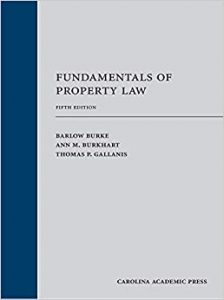Now in its fifth edition, the strength of Fundamentals of Property Law has always been its comprehensiveness in both a traditional and innovative sense. The use of statutes makes it possible to focus some classes on statutory analysis. Shorter judicial opinions make it possible to lay out fundamental rules in one opinion and show their application in another. With these objectives in mind, the authors have followed four guidelines in preparing the casebook:
(1) Case selection has emphasized rules that are widely accepted in practice. Included are opinions that adopt a minority view only when they also state the majority position clearly, so that students will not be misled about the current state of the law.
(2) Shorter cases have been preferred over longer ones, and short expositions of the rules have been preferred over treatise-like opinions. Students should also become familiar with the treatises and law review literature on the subjects raised in the cases as casebooks are a necessary, but not sufficient, guide to the law.
(3) Many of the cases and notes that follow them deal with questions of statutory interpretation. The law of real property is less affected by statutory change than many areas of the first year curriculum, but learning to understand the role statutes play in our legal system is of vital importance for all students of the law.
(4) The nature of the law of property is illuminated by many disciplines. The authors emphasize no particular discipline in selecting cases, writing notes, or defining problems; much of the material in the casebook lends itself to a broad approach to the law.
Product details
- File Size: 3938 KB
- Print Length: 1034 pages
- Publisher: Carolina Academic Press; 5 edition (January 1, 2020)
- Publication Date: April 6, 2020
- Language: English
- ASIN: B086T6J17V
- Text-to-Speech:
Enabled

- Word Wise: Enabled
- Lending: Not Enabled











